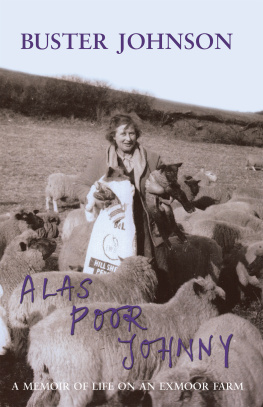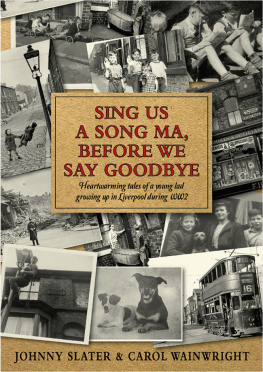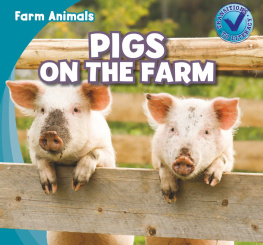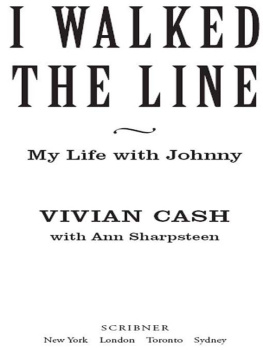Copyright Buster Johnson 2015
Foreword Boris Johnson 2015
The moral right of the author has been asserted
Apart from any fair dealing for the purposes of research or private study, or criticism or review, as permitted under the Copyright, Designs and Patents Act 1988, this publication may only be reproduced, stored or transmitted, in any form or by any means, with the prior permission in writing of the publishers, or in the case of reprographic reproduction in accordance with the terms of licences issued by the Copyright Licensing Agency. Enquiries concerning reproduction outside those terms should be sent to the publishers.
Matador
9 Priory Business Park
Wistow Road
Kibworth Beauchamp
Leicester LE8 0RX, UK
Tel: (+44) 116 279 2299
Fax: (+44) 116 279 2277
Email:
Web: www.troubador.co.uk/matador
ISBN 978 1784628 444
British Library Cataloguing in Publication Data.
A catalogue record for this book is available from the British Library.
Matador is an imprint of Troubador Publishing Ltd
For Buster and Johnnys grandchildren and great-grandchildren, and all who come after.
Birdie (ed)
Contents
Foreword
I can see it so clearly in my minds eye the moment my grandmother is overwhelmed by disaster.
We are in the kitchen of West Nethercote, a 14th century farmhouse on Exmoor, and though it is getting on for suppertime the sun is shining through the window behind her, illuminating her grey-fair hair and glowing through the great glass hemisphere in her hands. It is a special evening, because Granny has made her signature dish.
She is about to serve her meisterwerk, a main course that is to be greeted with acclaim and eaten with ravenous appetite. She is beaming, as well she may.
Many are the culinary difficulties that she has overcome.
I am not sure that she was ever really taught to cook. She was born in the Pavillon du Barry at Versailles; she went to Cheltenham Ladies College; she read Russian and got a half-blue for judo at Oxford. No, I dont think cooking featured much on her early curriculum.
It would be fair to say that her kitchen a converted cow-byre was not exactly a chefs paradise. She had no mixing machines. When Granny Butter (as we grandchildren used to call her) churned butter, she churned it by hand.
When the concrete floor needed cleaning, Granny would get handfuls of wet tea leaves, hurl them into the dusty corners, and sweep up the gloop with a broom.
Her fridge was a tiny cube that ran on calor gas, so frosted with surplus ice that the door would barely shut. Her stove was the Rayburn, which could take half a day to get warm, and whose lower oven was home, in the spring, to tiny orphaned lambs.
She had no collection of fancy saucepans, no Sabatier knives and yet she produced dishes whose tastes and smells I can remember today, almost half a century later, with Proust-like rapture.
There was Grannys apple crumble, made with huge sour green apples and lemons; and in the afternoons we were invited to use her special spatula, called bluey, to mix the flour and the sugar and the butter together to the point where we were allowed to abandon bluey and dive our fingers in, rolling and sieving until we had thousands of buttery nodules that we knew would go golden and crunchy on top.
If there was one pudding more exciting than Grannys apple crumble, it was Grannys ice cream made by mixing Carnation milk with cocoa and pouring it into the ice trays of her fridge.
But her all-time number one creation was something she called risotto. Here is the recipe for Granny Butters risotto.
1. Boil up a large quantity of Uncle Bens rice. 2. Chop up a load of tomatoes and onions. 3. Open several cans of tuna fish. 4. Shove them all together in the biggest bowl you can find.
Put like that it sounds a bit primitive, but it makes me hungry just to think about it. In fact the only trouble with Granny Butters risotto was that there was never enough of it. We would lick clean the bowl in about five minutes.
Now, though, she has made a huge amount enough to feed umpteen children, grandchildren and other hangers-on. She holds high the heavenly half-orb, smiling a smile of triumph. And as she does so the heavy bowl slips squeaking through her damp fingers.
It falls from her hands. It strikes a glancing blow on the white enamel-topped table and then shatters into a million fragments on the floor.
There is a silence. We look in horror at the waste and desolation, the glass shards winking in the tuna. Someone starts to cry.
What does Granny do?
Never mind, she cries, waving her arm theatrically, imperiously. I am sure it will be delicious!
And by God she scoops up the entire mess, and puts it in another bowl and then serves it up, and leads by eating it herself, her bright eyes daring us to do the same. So we follow her example. And of course it IS delicious, if a bit crunchy now and then.
Granny Butters key quality was her unconquerable optimism.
Nethercote is the farm high in the Exe valley where she and my grandfather had lived since 1952. It is a place of wild and romantic beauty just about the most remote and unspoiled valley I can think of in England. But there can be days when it demands a bit of mental fortitude.
Granny had no dishwasher and no washing machine and no central heating, and she had electricity supplied by a diesel generator that was constantly packing up.
She had to cope with my grandfather and four children and everyone who was trying to help him make a living out of this spectacular but unprofitable piece of semi-moor. At one stage she had to cope with 13 dogs, not all of them perfectly house-trained.
There was Kylie, the big red and white sheepdog, who bit me quite properly when I tried to ride him like a horse. There was Shebie and Coca and Cola and Crumpy and Scrumpy and Janey and Rogue, and above all there was an especially aggressive and territorial terrier called Tiddles, my grandfathers favourite.
They filled the house with their irrefutable doggy presence but no crime they committed, no mess they made, nothing they did could damage the dogs in the esteem of Granny Butter. Dogs were amazingly intelligent and loyal, she would explain even though her own repeatedly ate her hearing aid, or chewed it beyond repair. And so, in her view, were most members of the animal kingdom.
She even loved the geese. These were by some way the most frightening animals on the farm. They would come charging towards you with necks arched, orange tongues vibrating in their gaping beaks.
Dont run, darling, Granny would say. They can sense your fear. All animals can sense your fear.
Granny didnt run from the geese, or tiptoe past them. She would stride towards them, chanting her special feeding-time song, Foodee, foodee, foodee-foodee FoodEEE, and out of her bucket she would hurl a wide arc of grain through the air.
The geese would honk with pleasure and truffle for the golden nuggets in the grass. They liked Granny; Granny liked them.
The animals were often ill, with blackleg and other appalling-sounding complaints. But if they were ill, it was just the way things were, a function of the general harshness of the environment. It wasnt through lack of care from Granny.
She would take orphan lambs, and feed them by hand, and she would let us grandchildren help her. I remember the gulping speed with which they would drain the big bottles of powdered milk, their little throats rising and falling as they glugged it down.
Not unreasonably, the lambs often formed the impression that Granny was their mother. Everywhere that Granny went, they were sure to go and so would we.














